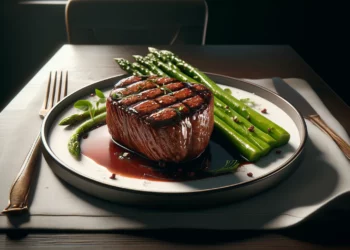It’s time to say goodbye to the currywurst and the schnitzel at universities in Berlin — and say hello to vegetables and meat replacements.
Students eating at campus canteens will have make to big cuts to their meat and fish options, as universities turn to more climate-friendly menus. The move marks a big shift for Germany, with companies such as Volkswagen also changing menus at the office.

There are almost 200,000 university students in Berlin, who regularly visit 34 canteens and cafes throughout the day. From October, each of these sites will have to offer a menu 68% vegan, 28% vegetarian and 2% fish-based – with only one meat option four days a week. It’s a big change, as cafeterias now offer 30-50% vegetarian options (which is still far more than in places like the US).
“We developed a new nutritional concept mainly because students have repeatedly approached us with the request for a more climate-friendly offer at their canteens,” Daniela Kummle of Studierendenwerk, the organization providing economic, social, health and cultural support to students at Berlin’s universities, told The Guardian.
In fact, there’s already a critical mass of students in Berlin following a meat-free diet. A 2019 survey showed that 33% of the university students in the city were vegetarian, while 13.5% said to be vegan. From October, they will have even more food options to choose from, such as pasta bakes, buckwheat and spelt bowls and marinated beetroot.
Berlin’s Free University opened in 2010 a canteen selling vegetarian food called Veggie 1.0. Then, in 2019, it opened a vegan-only canteen, called Veggie No 2. Both are run by the Studierendenwerk, which described the canteens as an experiment and said they didn’t want to change people’s diets. It was the first of its kind at a German university.
“The great success of the vegetarian and vegan canteens has made it clear that students’ consumer behavior is changing. There’s a clear trend towards fewer animal-based products,” Kummle from the Studierendenwerk organization told The Guardian.
Such a move doesn’t only apply to universities. Employees at the Volkswagen factory in Wolfsburg in the north of Germany used to be so keen on sausages that the car maker started making its own, with a team of 30 people making them every day. Now, the company has decided to cut out its production because of carbon emissions.
Germany recently introduced a rule that forces companies with office and factory canteens to start introducing one meat-free day per week to cut down emissions. Volkswagen decided to take it a step further, not making any more sausages. Still, not everybody is on board, with a former German chancellor recently complaining about it.
What’s the deal with beef?
Meat is one of the main global contributors to greenhouse gas emissions. Red meat, in particular, takes up more land, uses more water, and produces more carbon dioxide than non-meat alternatives.
In addition, cows and other ruminant animals like sheep emit methane in a process known as enteric fermentation, which is the origin of cows’ burps. Methane is a greenhouse gas 80 times more potent than CO2 and its concentration in the atmosphere is now higher than at any moment in at past 800,000 years, as climate experts have recently warned.
A study by the UN found that annual emissions from animal agriculture, including production and land-use change, account for 14.5% of all human emissions – with beef contributing to 41%. And they could grow even more in the future, as the growing middle classes in developing countries shift their diets towards higher meat consumption.
Demand of beef would grow by 88% between 2010 and 2050, according to the World Resources Institute, with pastureland expanding by about 400 million hectares. The resulting deforestation would make it very difficult limiting temperature rise to 1.5ºC or 2ºC, the overall objectives in the 2015 Paris Agreement on climate change.
This is where diets shifting away from beef come in handy. As in Germany, several countries are making progress. Per capita beef consumption has dropped a third in the US since 1970, with growing alternatives of plant-based burgers that are competing with conventional meat products thanks to their similar taste and price.
It’s unsurprising that university campuses would bring a change in sustainable eating, but whether or not this catches to other social groups (and other countries) remains to be seen. If we are to limit greenhouse gas emissions and avoid catastrophic climate change, this is the type of action we need to take.






